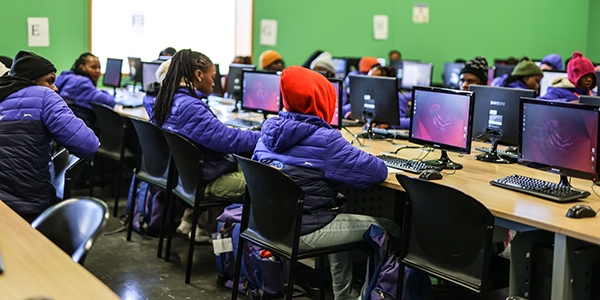Wits Targeting Talent Programme thrives for nearly two decades
- Wits University
The programme has been empowering young minds and nurturing their potential for a brighter future for good.

The University of the Witwatersrand (Wits) has recently bid farewell to the final edition of its renowned Targeting Talent Programme (TTP) pre-university enrichment initiative after almost two decades of implementation.
TTP was initiated by the Student Equity and Talent Management Unit (SETMU) 17 years ago.
The programme ensured that talented learners from both well-resourced and socio-economically disadvantaged backgrounds across South Africa were prepared for admission into South African Higher learning institutions.
Through this programme, Wits has successfully assisted almost 4000 graduates who have studied in Higher Education institutions.
Over the years, the TTP supported learners and teachers in formal schooling with a focus on Grades 10, 11, and 12 and the Maths, Sciences, Social Sciences, and Finance clusters of subjects.
The programme was conducted annually during the June/July school break at Wits University and is a two-week residential enrichment programme.
Attending the TTP's last Commencement Ceremony, Vice Chancellor and Principal of Wits University, Professor Zeblon Vilakazi, said that TTP is dedicated to nurturing and empowering talented learners.
"Through this programme, we changed the narratives, we changed the view that poverty will determine your future. You cannot determine where you were born, but you can determine where you are going. The programme is not about bridging the gap, is about empowering the bright minds to navigate the challenges they will encounter. TTP has crossed boundaries and attracted learners across all provinces."

Director of the Wits SETMU, Zena Richards, said the impact of TTP cannot be quantified.
"The history and journey of the TTP have been truly inspiring, starting in 2007, with a cohort of 267 grade 10 learners and 46 of their educators. The impact cannot be quantified due to the personal evolvement and professional development of alumni in their homes, communities, and world of work."
While learners say they are sad the programme is coming to an end, they thanked the donors for their unwavering support throughout the years.
As the final TTP concludes its journey, the reverberating effects of the program were felt across the nation. Countless success stories emerged, with TTP alumni becoming trailblazers in various fields.
The Vice Chancellor thanked the donors and the visionaries behind the TTP.
Brief history of TTP
The TTP was successfully launched in 2007, with a cohort of 267 grade 10 learners and 46 of their educators. The learners and educators were from 41 schools across three provinces, namely Gauteng, Limpopo, and Mpumalanga, funded by Goldman Sachs and the Telkom Foundation.
For the 2010 intake, the TTP was jointly funded by Beyond Petroleum South Africa (Pty) (BP SA) and the South African National Roads Agency (Pty) (SANRAL) for the period 2010–2012. A total of 191 learners from three provinces, namely Gauteng, Limpopo, and Mpumalanga, completed the programme.
During the same period, 94 learners funded by the Limpopo Department of Education successfully completed the programme. The cohort of learners were from Limpopo Province.
The Department of Science and Technology (DST) commenced their funding period from 2011 to 2016; DST funded 830 learners in the programme. The cohorts of learners were from all the nine provinces in South Africa.
In 2013, the BP South Africa Education Foundation Trust (BPSAEFT) independently funded learners from 2013 to 2022. BPSAEFT has funded 1328 learners, having completed their funding cycle in October 2020. Funded learners were from three provinces, namely Gauteng, Limpopo, and Mpumalanga.
The Industrial Development Corporation (IDC) commenced their funding for the TTP in 2011 with 21 learners from Limpopo. In 2015, the IDC re-invested in the programme and funded 47 learners from eight provinces. The cohorts of learners were from all provinces in South Africa except the Western Cape.
SANRAL independently funded a cohort of 49 learners from 2013 to 2015. The 49 learners were from three provinces, namely Gauteng, Limpopo, and Mpumalanga.
In 2016, the Manufacturing, Engineering, and Related SETA (merSETA) funded 23 learners, who completed the programme in June 2018. The 23 learners were from three provinces, namely Gauteng, and Limpopo.
In 2017, PRIMEDIA and Standard Bank funded 17 and 47 learners, respectively. These learners completed the programme in June 2019. These learners were from Gauteng, Mpumalanga, the Free State, and the North West provinces.
In 2018, the African Explosives and Chemical Industries (AECI) funded nine learners. These learners completed the programme in October 2020. The funded learners were from the Northern Cape and Mpumalanga.
In 2019, the Education, Training, and Development Practices (ETDP) funded 99 learners. These learners completed the programme in August 2021. In 2021 and 2022, the ETDP SETA reinvested to fund a further 80 learners. Thus far, the ETDP SETA has funded 257 learners since 2019. Their funding cycle ends in 2023. The cohorts of learners were/are from Limpopo Province.
In 2021, Assmang and Boleng started their funding cycle and funded 50 learners. They reinvested to fund a further ten learners. Thus far, the Assmang-Boleng Trust has funded 60 learners. Their funding cycle ends in 2023. The cohort of learners are from the Northern Cape province.
In 2021, Cell C funded 60 learners. They reinvested to fund a further 14 learners. Thus far, Cell C has funded 74 learners since 2021. Their funding cycle ends in 2023. The cohorts of learners are from all provinces in South Africa except the East.
The programme boasts a 92% access rate to university since they were established.
